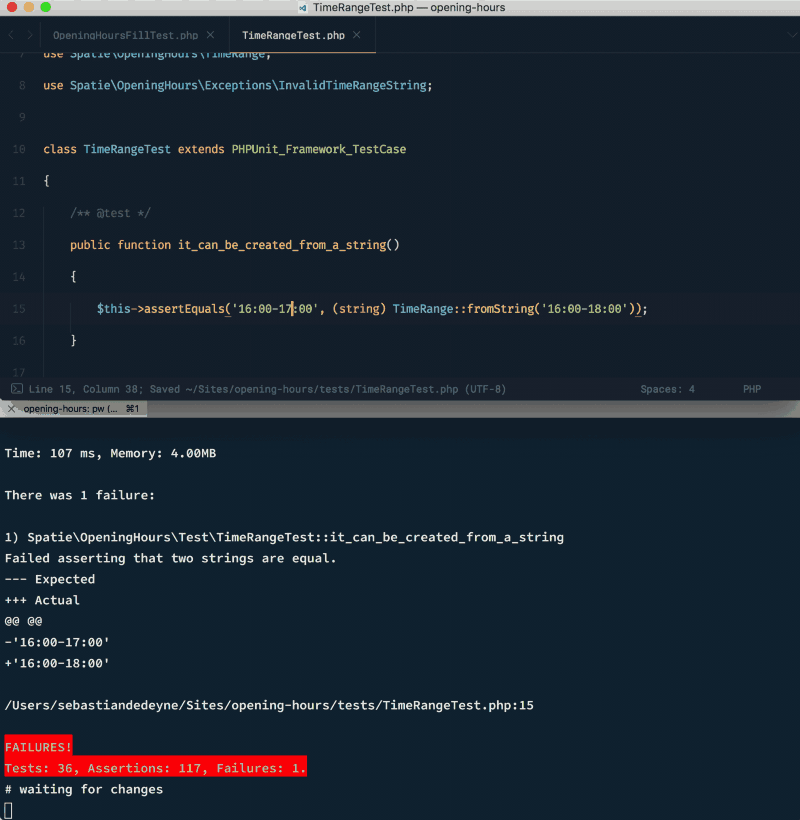Automatically running PHPUnit with Watchman
A little bash script to run tests when a file has been changed.
Since writing this post, we've realeased a pretty awesome PHPUnit watcher CLI tool that's easier to set up and has an interactive interface. You might want to use that instead!

If you just want a tl:dr, here's the script you can plop in whatever .bashrc file you're using—explanation follows.
#!/usr/bin/env bash function pw { run="clear && printf '\e[3J' && vendor/bin/phpunit" [[ -n $@ ]] && args=$@ || args="tests" eval "$run $args" watchman-make \ -p 'src/**/*.php' 'tests/**/*.php' \ --make=$run \ -t "$args"}The pw function runs your tests once by calling phpunit tests, watches every php file in src and tests, and runs the tests again when a watched file changes.
You can specify any PHPUnit arguments after pw, e.g. pw ./tests/Unit/FooTest.php or pw --filter test_true_is_true.
The script uses Facebook's Watchman library, which—on OSX—can be installed installed via Homebrew.
brew install watchmanWatchman watches files and triggers actions when they change. The reasoning behing choosing Watchman: it's easy to install, simple to configure, and reliable.
The watchman-make command—which ships with Watchman—is a specialised interface for Watchman to invoke build tools in response to file changes—exactly what we need!
Let's do a line-by-line review of our watch function.
function pw { }The function name determines the command name. I like short commands—PHPUnit is aliased to p on my machine—so an abbreviated version of phpunit-watch seems like a good fit.
run="clear && printf '\e[3J' && vendor/bin/phpunit"Since we're going to need the actual “run” command twice, let's store it in a variable. To break it down further, clear && printf '\e[3J' clears the terminal (to keep previous test runs from cluttering it) and vendor/bin/phpunit runs the tests.
[[ -n $@ ]] && args=$@ || args="tests"watchman-make needs arguments to work. (I'd love to be proven wrong here so I can clean this part up!) We'll default the arguments to tests, which means the actual command that we'll run is vendor/bin/phpunit tests. If we provide any arguments to pw, they'll replace test, for examplepw --stop-on-failurewould runvendor/bin/phpunit —-stop-on-failure`.
The next two commands bring everything together.
eval "$run $args"Manually triggers the command once before watching. This way we see immediately see test results without having to change a file first.
watchman-make \ -p 'src/**/*.php' 'tests/**/*.php' \ --make=$run \ -t "$args"Finally, time for the Watchman part! The -p parameter specifies which folders we want to watch. I personally set up way more globs like app/**/*.php and database/**/*.php since I'm mostly working with Laravel. --make specifies which command we're going to run on change, and will pass extra arguments to the --make command (remember, that variable we defaulted totests).
I'm still dreaming of a Jest-like CLI tool for PHPUnit, which also allows you to filter and rerun specific tests without breaking out of the watch function, but being able to run tests on change is already a vast workflow boost.
To wrap things up, here's the full pw function again:
#!/usr/bin/env bash function pw { # Register the command you want to run when changes are detected here run="clear && printf '\e[3J' && vendor/bin/phpunit" # Retrieve the custom argments. If none are provided, default to "tests" [[ -n $@ ]] && args=$@ || args="tests" # Run the command first... eval "$run $args" # ...then start watching for changes—and run on change watchman-make \ # Register files and folders you want to watch here -p 'src/**/*.php' 'tests/**/*.php' \ --make=$run \ -t "$args"}This post builds further on a Coffee and Code article by Jonathan Knapp.
